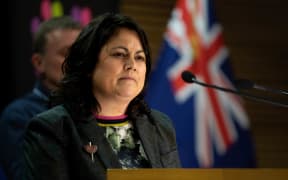
Photo: RNZ / Angus Dreaver
National is proposing a social investment fund as an election policy, saying it will help in identifying and funding social programmes that work.
It says it would set "better public service" targets to aim towards measurable goals which ministers would be held to account for.
The fund would be administered by a new Social Investment Agency, which would replace the Social Wellbeing Agency, and have a yearly work programme to evaluate the social impact of government programmes.
Speaking to the Victoria University School of Government today, the party's deputy leader and finance spokesperson Nicola Willis announced the policy which would see a fund set up to invest in programmes "that promise to change the lives of New Zealanders with the greatest needs".
"It will start small and scale up over time," Willis said.
"Initial funding would be provided by government through the Budget process, and would be topped up each year, including by redeploying funding from any government initiatives that may have received disappointing social impact evaluations."
She said it would have a range of options including social impact bonds, social outcome contracts "and other innovative ways of investing in longer-term outcomes for people, including partnering with external experts and agencies".
She raised the prospect of having private capital invested into the fund as well as using taxpayer funding.
"My hope is that the Social Investment Fund would become so effective at delivering results that ultimately New Zealanders seeking positive social change for the disadvantaged might choose to invest their funds with it."
The plan is modelled on an approach championed by former National Prime Minister and Finance Minister Bill English.
Willis said it would use standards, data collection, analysis, funding, commissioning and feedback loops to expand the delivery of early intervention programmes.
"The public sector has long collected data about people's life events, like education, income, benefits, migration, housing, justice and health. What's perhaps less well known is that that data can now be linked together and analysed using the 'Integrated Data Infrastructure' or IDI."
She also highlighted the Dunedin and Growing Up in New Zealand longitudinal studies as other data which could be used to support the funding approach.
She used the example of the Healthy Homes programme set up by National in 2013 and expanded in 2016, which the Labour government has continued to support and expand.
The programme is expected to be available in all regions in New Zealand by the end of the year, and a report this month found the effects were far-reaching: a nearly 20 percent reduction in hospitalisations, a 3 percent reduction in school absences, and a 4 percent increase in employment.
"The return on investment was clear and measurable: for every dollar the Government invested in the programme it reaped more than $3 in savings, with more savings expected to accrue over time," Willis said.
She said the current public sector was risk-averse and wary of data and measurement which "could make a well-intended and much-loved idea look like a failure".
"In some cases there is measurement, but it is of the wrong stuff - of the contracted outputs delivered, the boxes ticked, the number of times the social worker visited, or the information sheet was handed out, when what we really care about is whether the programme succeeded in delivering change for an individual and their family."






